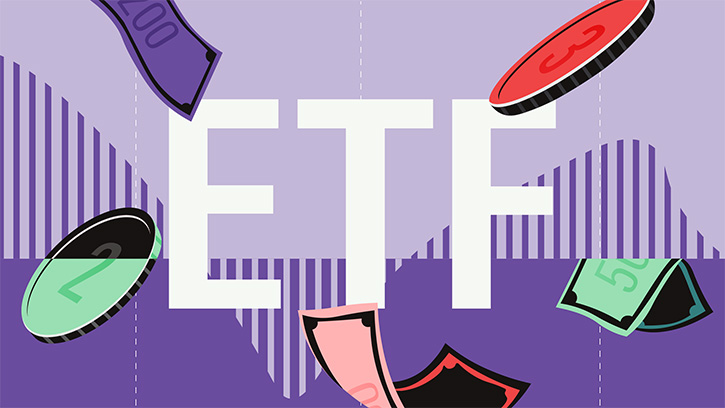
Income funds prioritise the generation of a regular income stream rather than capital appreciation. These are products designed for investors who want to enjoy periodic, low-volatility dividends, regardless of market conditions.
Achieving this goal is possible provided certain rules are followed when choosing the most appropriate financial product. Successful income investing, in fact, depends on many factors and not just on the selection of a portfolio of good dividend-paying companies.
When looking for periodic income, it's easy to be tempted by the companies with the highest dividend yields, or the funds with the best exposure to those specific stocks.
There are several nuances to consider when determining what constitutes a good high-dividend strategy, especially in the passive universe. Indeed, income investors are increasingly attracted to exchange traded funds (ETFs) for access to certain markets, drawn by their ease of use, transparency and low fees.
Beware Interest Rates
One consideration is the cost of money. Fixed income securities are not the only ones affected from changes in interest rates. High-dividend products, especially popular ones such as ETFs, are also rather sensitive to fluctuations in interest rates, as they compete with bonds on yield.
Regardless of interest rates, however, investors should be looking for funds with stable payouts and constant dividend growth, rather than the highest yield. A stable and continuous growth in dividends suggests responsible corporate management.
For example, a company paying a 1.5% dividend with a growth rate of 10% per year can generate more income in six years than a company paying 3% each year. It is therefore important to understand how the index replicated by the ETF chooses its securities to avoid the so-called "dividend trap".
In general, dividend strategies balance the yield from current income with the portfolio's ability to provide long-term capital growth. However, strategies may vary from fund to fund: some aim to maximise yield, while others prefer a lower but stable long-term income.
This means that investors need to conduct due diligence to determine which strategy best suits them.
Five Investment Ideas By Region
Below we list five income ETFs highlighted by our team of analysts on passive strategies, each for a different geographic region.
Fidelity Europe Quality Income UCITS ETF EUR Acc (FEQD)
This strategy earns a Morningstar Medalist Rating of Gold. The fund has maintained a significant overweight in quality exposure and an underweight in yield exposure relative to the category average. High-quality exposure means holding consistently profitable, growing securities with strong balance sheets. Low-yield exposure is based on holding fewer securities with high-dividend yields or buybacks, and instead holding securities in an early stage of development. Compared to competitors, the portfolio is overweight in the cyclical consumption and healthcare sectors, while financial services and utilities are underweight. Fees (0.30%) are among the lowest in the category.
SPDR® S&P US Dividend Aristocrats UCITS ETF (UDVD)
This US-focused strategy shows a greater presence of mid- and small-cap stocks than its peers within the Morningstar Category, and the portfolio has maintained an overweight exposure to liquidity and quality stocks. In recent years, this fund has consistently moved towards higher volume stocks than its Morningstar peers. This gives managers greater flexibility during bear markets to sell without adversely affecting prices. In recent months, the strategy has been more exposed to liquidity factors than its direct competitors. The strategy has also had a defensive bias. This ETF outperformed the average of its peers by three percentage points annualised over a 10-year period. Moreover, it outperformed the category index by 99 annualised basis points over the same period. As well as its low cost (35 basis points), these factors earn it a Medalist Rating of Silver.
iShares UK Dividend UCITS ETF GBP (IUKD)
This strategy has a more pronounced tendency to invest in value securities than its competitors. Analysing other factors, this fund has consistently moved towards stocks with higher trading volumes than its Morningstar peers in recent years. This gives managers more flexibility during bear markets to sell without adversely affecting prices. In recent months, the strategy has been more exposed to liquidity factors, while in recent years it has tended to hold more companies with high dividend yields or buybacks than its peers. Stocks with high yields may be more stable and mature companies, but sometimes extreme market pressures or deteriorating fundamentals may push them to cut dividends, which tends to hurt stock performance.
The portfolio is overweight financial services and basic materials compared to the category average by 7.6% and 5.9%, respectively, while industrials and healthcare are underweight. The portfolio has 62 holdings and is relatively concentrated. Specifically, 39.5% of assets are sitting into the top 10 holdings, compared to the category average of 23.4%. The fund has a Medalist Rating of Bronze.
WisdomTree Emerging Markets Equity Income UCITS ETF (DEMD)
This fund has a very broad and diversified portfolio that looks for companies paying the highest amount of dividends in US dollars. Initially, in constructing the portfolio, companies are assigned the standard weight they would have in a traditional equity benchmark (thus based on market capitalisation). The weights are then increased or decreased depending on the dividend yield they offer.
This approach typically favours companies in the utilities, materials and energy sectors, as well as financial stocks, which currently account for 28% of the portfolio, as these usually have above-average market yields. Currently, the combined weight of these sectors in the WisdomTree ETF is around 60%, compared to an average of 35% among funds in the same Morningstar category.
In the evaluation process, Morningstar analysts generally prefer screening companies by quality over basic performance. However, this judgement is 'softened' in the case of highly diversified strategies. This is the case with the WisdomTree ETF, which holds almost 500 stocks, thus helping to spread the risk of possible dividend cuts in the future. Compared to its peers, this tracker stands out due to its lower ongoing expenses of 0.46%. Morningstar assigns it a Medalist Rating of Gold.
Fidelity Global Quality Income ETF Inc (FGQI)
This strategy earns a Morningstar Medalist Rating of Gold. Over the past three years, it has beaten both its Morningstar category average (by 3.8% annualised) and its benchmark, the MSCI World High Dividend Yield index (by 4.3% annualised).
In terms of risk-adjusted performance, the fund has a Sharpe ratio – a measure of risk-adjusted return – higher than that of the index over the five-year period. Higher returns are often associated with higher risk and this strategy is no exception, with a standard deviation of 17.4% exceeding the benchmark's 15.1%.
In terms of portfolio exposure, US equities take the lion's share with a 65% weighting, above the category and index average. US companies responded to the 2020 dividend crisis by reducing share buybacks rather than cutting payments, in contrast to their European counterparts, who cancelled and cut billions in payouts. US banks were also allowed to continue making payments, while UK and EU regulators froze dividends for a number of months.
The ETF's largest holdings are technology giants Microsoft (MSFT) and Apple (AAPL), as well as chip company Nvidia (NVDA). The fund, which has ongoing charges of 0.40%, holds more technology stocks and fewer defensive stocks than its competitors.









.jpg)


















